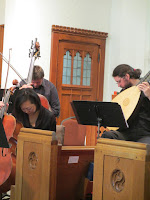Twenty-one events at 14 venues. 445 performers. Audience numbers: 2272.
 |
| Renaissance hair band? |
Bach Ensemble of St. Thomas. Suzanne Bona and Richard Goering duo. Cantantes Camarae. Cantigium. Catacoustic Consort. Cathedral Choir of St. Peter in Chains. Christ Church Cathedral Choir. Cincinnati Boychoir. Cincinnati Camerata. Cincinnati Chamber Opera. Cincinnati Recorder Consort. Chris Wilke. Collegium Cincinnati. Consort in the Egg. Edgecliff Vocal Ensemble. Harpers Robin. Knox Choir. James Meade. Miami Valley Recorder Consort. Rose Ensemble. Shakespeare Band. Vicars Choral. Walnut Hills Chamber Choir. Xavier University Concert Choir.
 |
| Jackie Stevens |
Soprano Jackie Stevens, hands down. She sang Dowland with the Shakespeare Band, Schütz with the Knox Choir, Padilla for the Albanese DMA lecture/recital, Pergolesi with Cincinnati Chamber Opera, Campion et al with Cantantes Camarae, and once more at Classical Revolution. All of these were beautiful, the Pergolesi most of all. English, German, Spanish, Italian . . . what, Jackie, no French? Slacker!
What were some memorable moments?
Harpers Robin played the gorgeous Por que Llorax Blanca Niña. We definitely need more Sephardic music in the Festival, and frankly in our everyday lives.
 |
| Pre-concert phone check |
The Rose Ensemble. Wow. Medieval harmonies, a rebec solo, the endless echoing of the vault of St Peter in Chains -- just, wow. And afterward, a hurdy-gurdy demonstration. A terrific event. I would love to have them back in town again.
 |
| Ring master Matthew Swanson |
Pergolesi’s Stabat Mater was staged as refugee parable, and it was very moving. Lauren McAllister and Jackie Stevens sang beautifully, and there was hardly a dry eye in the house.
 |
| Krista Feeney and Catacoustic |
 |
| Vikings Einar and Magnus |
Cincinnati Recorder Consort. We have watched this group ramp up for a couple of years now, and on Feb 23 it felt like they broke through. Renaissance (loved The Leaves Be Green) and Baroque (the Fasch made me hold on to my hat!) Recorder consort and mixed (they’ve got viols and harpsichordists lurking in there?) I think we need to keep our eyes on this group.
The CCM Early Music Lab Sampler/Organ Restoration Fundraiser at Prince of Peace Lutheran. The lute and harpsichord students got some serious accompanying and continuo-playing practice – important skills they rarely get to try. And the two viol performance cognate students, Stephen Goist and Wei-Shuan Yu, got to strut their stuff. For the Lab the collaborative event was a success on many levels, and the teachers are already talking about trying this more often. For the larger community it was at least 6 points on the Richter scale. The church was packed with former parishioners celebrating the building’s past and arts people curious about its future. Worship services have already resumed there as I write this, and bookings for future musical events are already getting penciled into the calendar. It was a re-birth, and thrilling to witness.
Cantigium. This year’s concert, which ended the Festival, was a terrifically good one. They were in great voice, in a perfect space (St. Boniface’s in Northside), and they had a delightful repertoire. In addition to the three centuries of Medieval, Renaissance, and Baroque music they lovingly brought to life, they ended with three pieces of 20th-century music.
Three
times during this Festival we heard music that was not early: during Chris
Wilke’s lute recital, at Classical Revolution (thanks again to Chris and his
partner in crime Bill Willits,) and in the Cantiguim concert. In all cases it
was 20th-century music that blended so nicely with its ancestors,
never the standard Mozart-Mahler range of conventional classical music. I find the
rapport between the very old and the very new interesting. Any explanations suggest
themselves?
Does Early Music have a future in
Cincinnati?
 |
|
This visually impaired singer was
reading music with her fingers!
|









